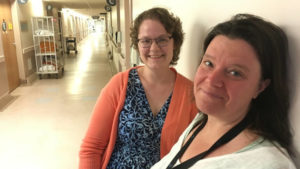Funding announced for 17 new midwives as well as additional dollars for midwifery programs

Soon-to-be and new mothers in Ottawa who want to receive medical care from midwives outside of a hospital or clinic have a few more options for prenatal and postnatal care.
The provincial government recently announced 17 new midwives for the Ottawa area as well as additional dollars for midwifery programs in the city.
A unique midwifery program that helps expectant mothers in high risk or special care situations is one of the programs getting new life with the funding.
The program is called Oracle and started with just one midwife, Amy McGee, who meets with an expectant mother outside a clinic when she doesn’t show up for her prenatal appointments.
Reaching out to pregnant women on the streets
“I’ll see people at the shelter, I’ll see people at their homes, I’ll see people at the jail. I’ll see people sometimes in Tim Hortons or I might even just chat with them on the street,” McGee told CBC Radio’s Ottawa Morning.
Oracle was launched in 2016 by McGee and Dr. Laura Gaudet when they noticed women weren’t keeping appointments.
There are a lot of reasons why an expectant mother might not show up for a medical appointment, but many of them deal with substance use or sometimes severe mental health disorders, they said. Some are worried their child will be taken away, so they try to stay under the radar.
“They feel that the hospital is not a welcoming place for them,” McGee said. “They might have a lot going on in their life where it’s hard for them to keep appointments. They might not have a telephone, so clerks here might have done their best to reach this person but the phone is no longer in service. Or they might not have money for bus fare.”
Sometimes there’s just these small little things that make a huge difference.
– Amy McGee, midwife
Gaudet told Ottawa Morning that pregnant women need to make sure they’re getting medical care.
“These women, for a whole host or reasons, are at exceptional risks for pregnancy complications for themselves and for their baby,” she said. ” A lot of the babies are very small because the mothers are not taking as good care of themselves as they’d otherwise be able to.”
Funding from the province has allowed the team to hire on another midwife, taking some of the load off McGee’s shoulders. It’s also letting McGee help clients in small, but meaningful, ways.
“What it means is that I have a little fund of money I can use to buy bus tickets, to buy food for people, to buy prescription medication that’s not covered, or diapers or formula or whatever, whatever it is,” she said.
“Sometimes there’s just these small little things that make a huge difference.”
Midwives on staff at the Montfort
Another program to receive funding is out of the Montfort Hospital.
Typically, a new mom who is under the care of a doctor will stay in hospital for up to two days after a baby is born, if the birth is low risk, and will return to the hospital for postpartum care.
With funding courtesy of the Ministry of Health and Long-Term Care, the Montfort Hospital will let mom and baby leave the hospital hours after birth and receive midwife care from home, as long as they’re given the go ahead from doctors, with up to three visits from the midwife in the first week after delivery.
It’s slated to start by June 1 with two midwives working out of the hospital serving an expected 250 families.
The program idea came from survey results that suggested new mothers wanted to head home earlier and get more supports for the transition from hospital to home, said Montfort midwife Laurence Tsorba in an interview with CBC Radio’s All in a Day.
“It’s to give … options for a woman,” Tsorba said.
She explained that if a woman wants to be part of the program, she’ll go to an information session before giving birth — the first contact between mom and midwife, she said.
Tsorba said she hopes that more midwives can be part of the program at the Montfort if it proves to be popular and that other hospitals follow suit.
“That’s a very good option for parents and families. So we hope that it could be imported to other hospitals,” she said.


